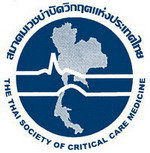Relationship between strain energy and alveolar overdistension in patients with acute respiratory distress syndrome: The research protocol
Relationship between strain and alveolar distension in ARDS
DOI:
https://doi.org/10.54205/ccc.v32.268588Keywords:
Acute respiratory distress syndrome, Ventilator-induced lung injury, Alveolar overdistension, Mechanical power, Stress, Strain, Strain energyAbstract
Background: Energy produced during mechanical ventilation has been established as a contributor to mortality in acute respiratory distress syndrome (ARDS) patients, elucidated through ventilator-induced lung injury (VILI). However, the potential association between strain energy, an engineering-based concept, and the risk of VILI remains unexplored.
Objectives: This study aims to investigate the correlation between strain energy and alveolar overdistension and the relationship between strain energy and single-breath mechanical power (MP) calculated by a simplified formula in patients with ARDS.
Methods: A prospective observational study will be conducted on moderate to severe ARDS patients under sedation and paralysis. We will gradually reduce positive end-expiratory pressure (PEEP) by two cmH2O every two minutes from 20 to 8 cmH2O in pressure-controlled ventilation mode. During decremental PEEP titration, patients would be monitored simultaneously for esophageal pressure and electrical impedance tomography (EIT). Data gathered from the mechanical ventilator and EIT during the decrementing PEEP titration were focused on seven PEEP levels: 20, 18, 16, 14, 12, 10, and 8 cmH2O, providing a dataset of 7 events per patient for analysis. Strain energy and single-breath MP were calculated from ventilator parameters, while EIT provided data on alveolar overdistension.
Hypothesis: We hypothesized that strain energy and single-breath mechanical MP correlate with alveolar overdistension in ARDS patients.
Conclusions: This study aims to assess the correlation between strain energy and alveolar overdistension, as well as the correlation between strain energy and single-breath MP in ARDS patients.
Ethics and dissemination: The study protocol has been approved by the faculty of medicine ethics committee, Ramathibodi Hospital, Mahidol University (COA MURA2023/718).
Trial registration: TCTR20240320001
Downloads
References
Juffermans NP, Rocco PRM, Laffey JG. Protective ventilation. Intensive Care Med. 2022;48:1629-31.
Chiumello D, Carlesso E, Cadringher P, Caironi P, Valenza F, Polli F, et al. Lung stress and strain during mechanical ventilation for acute respiratory distress syndrome. Am J Respir Crit Care Med. 2008;178:346-55.
Parhar KKS, Zjadewicz K, Soo A, Sutton A, Zjadewicz M, Doig L, et al. Epidemiology, mechanical power, and 3-year outcomes in acute respiratory distress syndrome patients using standardized screening. An observational cohort study. Ann Am Thorac Soc. 2019;16:1263-72.
Costa ELV, Slutsky AS, Brochard LJ, Brower R, Serpa-Neto A, Cavalcanti AB, et al. Ventilatory variables and mechanical power in patients with acute respiratory distress syndrome. Am J Respir Crit Care Med. 2021;204:303-11.
Gattinoni L, Tonetti T, Cressoni M, Cadringher P, Herrmann P, Moerer O, et al. Ventilator-related causes of lung injury: the mechanical power. Intensive Care Med. 2016;42:1567-75.
Chiumello D, Gotti M, Guanziroli M, Formenti P, Umbrello M, Pasticci I, et al. Bedside calculation of mechanical power during volume- and pressure-controlled mechanical ventilation. Crit Care. 2020;24:417.
Trinkle CA, Broaddus RN, Sturgill JL, Waters CM, Morris PE. Simple, accurate calculation of mechanical power in pressure controlled ventilation (PCV). Intensive Care Med Exp. 2022;10:22.
Marini JJ, Rocco PRM, Gattinoni L. Static and dynamic contributors to ventilator-induced lung injury in clinical practice. pressure, energy, and power. Am J Respir Crit Care Med. 2020;201:767-74.
Force ADT, Ranieri VM, Rubenfeld GD, Thompson BT, Ferguson ND, Caldwell E, et al. Acute respiratory distress syndrome: The Berlin Definition. JAMA. 2012;307:2526-33.
Costa EL, Borges JB, Melo A, Suarez-Sipmann F, Toufen C, Bohm SH, et al. Bedside estimation of recruitable alveolar collapse and hyperdistension by electrical impedance tomography. Intensive Care Med. 2009;35:1132-7.
Chiumello D, Cressoni M, Colombo A, Babini G, Brioni M, Crimella F, et al. The assessment of transpulmonary pressure in mechanically ventilated ARDS patients. Intensive Care Med. 2014;40:1670-8.
Yoshida T, Amato MBP, Grieco DL, Chen L, Lima CAS, Roldan R, et al. Esophageal manometry and regional transpulmonary pressure in lung injury. Am J Respir Crit Care Med. 2018;197:1018-26.
Nieman GF, Satalin J, Andrews P, Habashi NM, Gatto LA. Lung stress, strain, and energy load: Engineering concepts to understand the mech-anism of ventilator-induced lung injury (VILI). Intensive Care Med Exp. 2016;4:16.

Downloads
Published
How to Cite
Issue
Section
License
Copyright (c) 2024 The Thai Society of Critical Care Medicine

This work is licensed under a Creative Commons Attribution-NonCommercial 4.0 International License.




